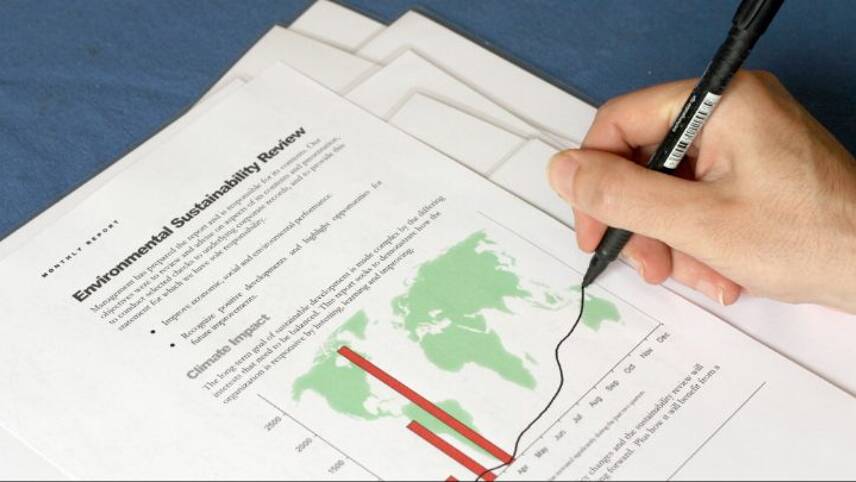Register for free and continue reading
Join our growing army of changemakers and get unlimited access to our premium content

The US Security and Exchange Commission (SEC) has today unveiled a new draft rule which, if implemented, will require businesses to disclose their emissions in a unified way, including Scope 3 (indirect) emissions.
Businesses will only be required to disclose Scope 3 emissions if they are “material”. This is a potential loophole but, according to CDP, most large businesses have Scope 3 emissions that are 11.4 times higher than their direct emissions, which would make them “material”.
The draft directive will also require businesses to publicly outline how they plan to reach their emissions targets and detail future climate-related risks and opportunities to their businesses and supply chains. Risks may arise from the physical impacts of climate change, from changing legislation and investment trends amid the clean energy transition, or through company reputation. The introduction of a carbon tax and the subsequent increase in carbon pricing is also listed by the SEC as something which businesses must consider.
Additionally, the draft directive includes measures to ensure that the SEC can question their environmental claims. For example, the SEC would be able to ask how a business is defining and delivering net-zero or carbon-neutrality.
Noted in the draft directive is a requirement for companies to file the disclosures in their annual reports. This would make the information visible to investors and other key stakeholders.
It is expected that the directive will be finalised later this year and a timeline set out for its implementation. A public comment period will now begin, followed by a final rule proposal by the SEC and, finally, a vote.
Several US news outlets are reporting that there is likely to be some pushback against the directive, from companies looking not to allocate more funding and resource to disclosures and from members of Congress who still believe climate action is a political topic and that the SEC would, therefore “politicise” itself by implementing the directive.
However, there is also strong support – particularly amid the boom in ESG investing. More than $649bn was invested in ESG-focussed funds globally in 2021, with the US being the largest market.
The re-implementation of Paris-Agreement-aligned climate targets under Biden, after Trump pulled the US out of the Agreement, is another reason why many are supporting greater corporate climate disclosures.
A recent poll by Ceres found that 87% of US-based adults would support legislation requiring corporations to report their climate-related risks.
The Union of Concerned Scientists’ accountability campaign director Kathy Mulbey said: “This new SEC rule is an important step toward recognising that rising heat-trapping emissions and rapidly worsening climate impacts pose a significant risk to our financial and economic system and that accounting for those risks can help businesses and shareholders to proactively safeguard their investments.
“The SEC has a duty to protect the public against these mounting risks by compelling companies to disclose information important to investors, and this rule falls squarely within the agency’s mandate.”
The head of E3G’s Washington DC Office, Claire Healy, added: “This has been a long time in the making and there is still a lot of work to do to strengthen and implement the SEC recommendations.
“This rule by the SEC is a powerful step towards making it easier for private investors to do the right thing and more swiftly shift their investments to build a low carbon economy. Embedding this information in investment decisions makes common sense and should lead to a fast-tracking of clean energy and a more robust framework to manage economic and financial risks. Recent events have shown the need for both so today’s move is most welcome.”
Research published last week revealed that one-third of US firms already believe they are losing business by failing to properly respond to the climate crisis.
In context: Risk and reporting
The UK is notably introducing mandatory climate risk disclosures for some corporates in April and will gradually widen the scope of the mandate in the coming years. At the G7 meeting last summer, all member nations committed to follow suit by 2025.
Climate risk and the need for an accelerated response – both by reducing emissions and building in adaptation – has been in the news this month, due to a major new report from the Intergovernmental Panel on Climate Change (IPCC). The report warned that humanity risks creating a future that is “not liveable” for more than three billion people, due to historic failures on both mitigation and adaptation.
Earlier this year, the World Economic Forum (WEF) named climate inaction as the world’s third-largest near-term risk, behind only extreme weather and Covid-19. In the medium-term and long-term, climate inaction is classed as the largest risk.
Sarah George


Please login or Register to leave a comment.